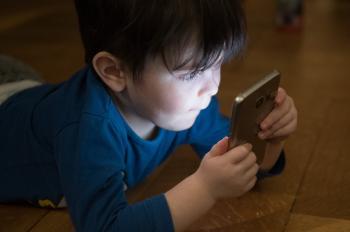
Some experts try to warn us of an epidemic that threatens children in the first years of their lives. There are more and more conclusive studies that claim that the abusive use of mobile screens and tablets can cause language and sleep disorders in the youngest children; besides the isolation and the low tolerance to the frustration that it provokes.
There are more and more groups of pediatricians, speech therapists and psychologists, who ask the authorities to carry out campaigns to report the effects of children's overexposure to screens, as is done with alcohol, tobacco and drug addictions.
The danger of dopamine as a claim
In the same way that happens in small children, adults or adolescents, we are becoming more and more addicted to dopamine, which provides us with the rewards we receive through social networks and games.
Experts in addictions compare the mobiles and tablets with real dopamine bombs, known as the hormone of happiness, which as we receive a "like" or a similar reward, there is a discharge of this substance in the brain that It satisfies us In short, that from small we are consuming applications that have been designed to make us addicted to the screens.
The problems in young children
Anne Lise Ducadan, a Primary Care physician who attends to young children in Paris, has long since detected how distressing symptoms reminiscent of autism are multiplying and she is convinced that action must be taken urgently. The doctor explains that there are cases of children who can not sleep without the cell phone, with serious communication and concentration problems.
The mother of the 3-year-old explains that her son "gets angry and breaks his cell phone or tablet if there is no coverage, he can not stand the fact that there are no moving images. spend hours like that. "
Dr. Ducadan explains that she saw many children with the same type of problem until she realized the seriousness of the exposure to the screens. They are children who live in a bubble, who do not respond when they hear their name, or look into their eyes when they are spoken to.
Parents often feel guilty, Ducadan adds, but the reality is that they do not have information to know the consequences of their children's overexposure to the screens. The truth is that a child immediately abandons toys and games, but never tires of looking at a screen. If you do not say "enough", it would never stop. They are totally addictive, they can not be without them, and doing so generates an intense discomfort, like a drug addict when they are without their dose.
According to Dr. Ducadan, it is necessary for the authorities to react, since prolonged exposure is becoming more common and it is very important to be informed of it.
What do the studies say?
In the US, digital devices have long occupied a lot of space. According to a study by the NGO Common Sense, American children under the age of 8 spend more than 2 hours a day in front of a mobile screen.
Dr. Nicholas Kardaras wrote a book about children and screens, where he talks about digital heroin. "Working with young children, I began to see the same clinical symptoms as in the cases of drug addiction: withdrawal syndrome, impulsivity, aggressiveness ... that's why I started to investigate and discovered that these devices generated dopamine.
Dopamine is the hormone that pushes us to constantly pick up the cell phone and the one that feeds the so-called brain reward circuit. This circuit drives us to have essential behaviors for survival such as food, sexual relations, etc. Dopamine circulates through our brain and makes an experience pleasant. People want to know what happened, what the latest news is and when we have it, it provides us with a dopamine discharge. But this has a price on our brain. The frontal cortex shrinks if we are facing screens for an excessive time.
Consequences in our brains
In China, Internet addiction is considered one of the most serious public health problems. Researchers analyzed 15 adolescents with Internet addiction with a brain scan, and the result showed that the circulation of the fluids was altered. The communication area was severely restrained, and the problems of brain connections can cause symptoms reminiscent of autism or bipolar disorders.
A person who has a shrunken frontal cortex and a lower gray substance density becomes more impulsive, is more prone to addictive behaviors, is more aggressive and does not make such wise decisions because his ability to make logical linkages is altered.
What can we do?
The good part is that there is no permanent damage to the brains of the exposed children. It is enough to move the children away from the screens so that they recover their mental capacities.
Children should be kept away from screens, they should be prevented from being overexposed, they should be offered other games, other stimuli, more human interaction. The most important thing is for parents to look and talk a lot with their young children.
For more information consult the 9th Report FAROS Las nuevas tecnologías en niños y adolescentes. Guía para educar saludablemente en una sociedad digital which aims to offer parents and educators a complete guide on how to guide and accompany children in the use of digital technologies under a positive approach.
Experts of recognized prestige in the matter participated in the Report, including from the Unidad de Conductas Adictivas del Servicio de Psiquiatría y Psicología Infantil y Juvenil del Hospital Sant Joan de Déu Barcelona.
Fount: FAROS Sant Joan de Déu
Barcelona, 17/07/2018
- Log in to post comments
